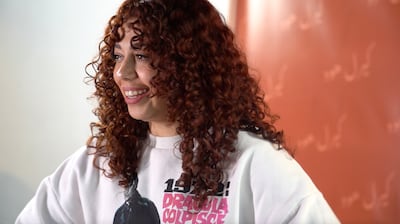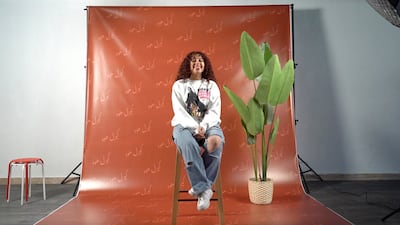Reema Bakri grew up in Amman under pressure from her grandmother and other relatives to straighten her hair.
The marketing student had a mop of curls, like most of the 8,000 people who follow her on Instagram for tips and products to help them care for their locks.
“My grandmother always said ‘you have to cut your hair and you should look like your sister’,” says Reema, referring to her flaxen-haired sibling Rawan.
“I was jealous, wondering why she has straight, blonde hair. I was always like, ‘I am the one who looks weird’.”

“No one taught me me how to take care of it, how to love the thing I have,” she says, and the constant observations gave her “a lot of insecurity”.
But five years ago, at age 21, Reema realised her hair was nothing to be ashamed of.
She took to the internet to counter what she describes as stigma in Jordan, and in the wider Arab Middle East, associated with curly hair.
“In school I was bullied and in the street. It is in the culture,” she says.
She started as a blogger, “teaching boys and girls how to take care of their hair and understand that natural beauty is a part of your journey”.
The issue has made it on to the legislative agenda in Washington.
The US House of Representatives passed a draft law against hair discrimination on March 18, in response to lobbying, mostly by African Americans.
The Creating a Respectful and Open World for Natural Hair (Crown) Act has yet to approved by the upper house.
In Jordan, Reema says the stigma is not a byproduct of racism.
“I don’t think that [racism] is the reason in the Middle East. We have a beauty standard that is weird,” she says.

She says the problem is mainly among older people, who tend not to accept “curl heads,” as people with curly hair are sometimes called.
“They have something in their mind that only straight hair is beautiful, and that if I have curly or big hair I cannot get married because I don’t look like the others,” she says.
Her Instagram page is called CurlHood. She describes it as “a community, a movement to change the perspective” in addition to being a commercial brand.
“If you have curly or big hair people [think] you don’t look elegant. This is the perspective they have. I want to change that,” she says.
“We are facing the old generation. The young generation love their hair. They have the self-love vibe but they have to struggle a bit.”
One of Reema’s customers, a model with a 5-year old daughter, told her straight-haired kids bullied the girl at kindergarten.
“I don’t believe in beauty standards. We have to break them,” says Reema, who is half-Lebanese.
Her dream is to set up a beauty salon in Dubai. She has already earned a diploma in natural hair care.
“You don’t have to change how you look, how you think just because of the society,” she says. “I love my hair now. It is part of my personality.”

